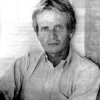Bruce Chatwin

Bruce Chatwin
Charles Bruce Chatwinwas an English travel writer, novelist, and journalist. His first book, In Patagonia, established Chatwin as a travel writer, although he considered himself instead a storyteller, interested in bringing to light unusual tales. He won the James Tait Black Memorial Prize for his novel On the Black Hilland his novel Utzwas shortlisted for the Man Booker Prize. In 2008 The Times named Chatwin #46 on their list of "50 Greatest British Writers Since 1945."...
NationalityEnglish
ProfessionNovelist
Date of Birth13 May 1940
I slept in black tents, blue tents, skin tents, yurts of felt and windbreaks of thorns. One night, caught in a sandstorm in the Western Sahara, I understood Muhammed's dictum, 'A journey is a fragment of Hell.'
As you go along, you literally collect places. I'm fed up with going to places; I shan't go to anymore.
When people start talking of man's inhumanity to man it means they haven't actually walked far enough.
Proust, more perspicaciously than any other writer, reminds us that the 'walks' of childhood form the raw material of our intelligence.
Music… is a memory bank for finding one’s way about the world.
I pictured a low timber house with a shingled roof, caulked against storms, with blazing log fires inside and the walls lined with all the best books, somewhere to live when the rest of the world blew up.
The song and the land are one.
If this were so; if the desert were 'home'; if our instincts were forged in the desert; to survive the rigours of the desert - then it is easier to understand why greener pastures pall on us; why possessions exhaust us, and why Pascal's imaginary man found his comfortable lodgings a prison.
A Sufi manual, the Kashf-al-Mahjub, says that, towards the end of his journey, the dervish becomes the Way not the wayfarer, i.e. a place over which something is passing, not a traveller following his own free will.
Because they knew each other's thoughts, they even quarrelled without speaking.
Walking is a virtue, tourism is a deadly sin.
And when you look along the way we've come, there are spirals of vultures wheeling.
I haven't got any special religion this morning. My God is the God of Walkers. If you walk hard enough, you probably don't need any other god.
Even today, when an Aboriginal mother notices the first stirrings of speech in her child, she lets it handle the things of that particular country: leaves, fruit, insects and so forth. We give our children guns and computer games, Wendy said. They gave their children the land.